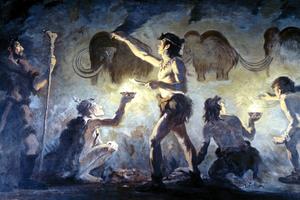You Were Made For God — This Is Why You Exist
If belonging to Christ means anything, then faith in him becomes the absolute center of our lives

The experience I have as a Christian — indeed, my very identity as a Christian — is not something I derive from any human or scientific source; it is not, thank God, dependent upon the laws of physics or psychology. It is rooted rather in the reality of Jesus Christ, who is my Lord and Savior. And in the sacraments he instituted for my salvation. I belong to Christ, therefore, whom I am no end of grateful to live and move in me.
What this means, then, is that I needn’t live my faith as some distant and rarefied ideal, the always-imperfect observance of which I must more or less put up with along the way. Why should success in the spiritual life be the exclusive preserve of saints and mystics? That is hardly the stuff of the Christian life. If belonging to Christ means anything, if he is the defining event of my life, whose presence anchors the whole of my being, then faith in him becomes the absolute center from which everything that happens in my life is already taking place.
How wonderfully simple everything then becomes! No more nonsense about all those impossible heights of sanctity where the air is too thin for ordinary folk to breathe. As if God, having entered the human estate, effected no real change in the status of creatures made in his image. After all, if he is more present to me than I am to myself, to cite the common and universal teaching of the Church, then why must the life of virtue always remain excruciatingly beyond my reach? Why must the workaday conditions of my life amount to little more than a despairing moralism?
It’s not as if in putting on Christ I am expected to peel away layer upon layer of my ordinary humanity. Remember: it’s not a totally new suit I put on, rather the completion and perfection of an existing wardrobe, one that is both real and good.
And while it is certainly true that what happens in Baptism is nothing less than, to recall Pope Benedict’s expressive phrase, “the final mutation in the evolution of the human species,” it nevertheless remains a work of grace upon something already there — to wit, my nature. Wounded, to be sure, by the wickedness of both Adam’s sin and my own, but not wiped out owing to a God who, from moment to moment, literally loves me into being. The business of grace, therefore, is not to repress or replace that nature, but to redeem and restore it.
So, what is the overarching point here? That I am made for God, which is why he gave me a human nature in the first place. Given in nature, forgiven in grace, to put it in a formulaic way. This is why I exist now. So that still greater splendors may be given later. In the circumstance, therefore, the soul’s ascent to God need not be a grim affair, carried out against the grain of always being forced to choose between, say, duty and delight. Where is it written that we must succumb to the enchantments of sin? Is the appetite for God so anemic that at the first sign of struggle we surrender the fort?
“It is important to take seriously the implication that there really is an appetite for God, and for his righteousness,” writes Dominican Father Simon Tugwell, in a profound unpacking of Christ’s Sermon on the Mount (The Beatitudes: Soundings In Christian Traditions, Templegate Publishers, 1980). He continues:
“We all too easily speak and think as if righteousness resulted chiefly from the curbing of our appetites, as if our appetites were only for sin. But strictly speaking we have no appetite for sin. What we experience as an appetite for sin is a sick appetite which has mistaken its object. In moments of despondency we may perhaps look around and think that we should be much happier if we gave up trying to be good, if we could enjoy all the vices of the world around us. But that is only a fantasy. The desire for goodness is really a much more robust desire than any alleged desire for evil.”
This is why we turn to God — to ask him to deepen that desire, to intensify an appetite already planted in the soil of the human heart, so that in attending to its cultivation we grow ever more like Christ, loving as Christ loves and never counting the cost. This will not be the work of a weekend, which is why we anneal ourselves in hope, knowing that the time of convalescence may well last an entire life. In point of fact, says Father Tugwell, “Most of us, maybe, will still be barely at the beginning of our recovery even when we die. But that is better than killing ourselves pretending to be healthy.
“The appetite for God … makes a desire really too vast for most of us really to face up to all at once. Part, at least, of the disorder of our desires arises from a certain timidity, which prefers even small delights which are near at hand and easily obtained to larger delights which are more uncertain and difficult to acquire. We have trivialized ourselves, fobbing ourselves off with trinkets when we wanted a kingdom.”
But we can at least make a beginning (right now, if you like), asking God to give us the grace, even a little bit, begging him, in the words of the prayer he taught us: “Thy kingdom come…”
- Keywords:
- human nature
- meaning of life
- god

















